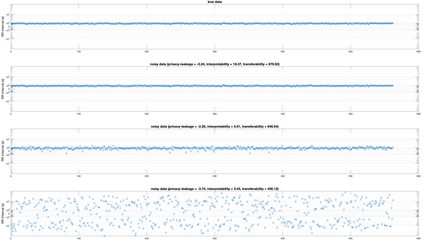In order to develop machine learning and deep learning models that take into account the guidelines and principles of trustworthy AI, a novel information theoretic trustworthy AI framework is introduced. A unified approach to "privacy-preserving interpretable and transferable learning" is considered for studying and optimizing the tradeoffs between privacy, interpretability, and transferability aspects. A variational membership-mapping Bayesian model is used for the analytical approximations of the defined information theoretic measures for privacy-leakage, interpretability, and transferability. The approach consists of approximating the information theoretic measures via maximizing a lower-bound using variational optimization. The study presents a unified information theoretic approach to study different aspects of trustworthy AI in a rigorous analytical manner. The approach is demonstrated through numerous experiments on benchmark datasets and a real-world biomedical application concerned with the detection of mental stress on individuals using heart rate variability analysis.
翻译:为了开发考虑到可信赖的AI的指导方针和原则的机器学习和深层次学习模式,采用了一种新的信息理论可信赖的AI框架; 考虑采用统一的方法,研究并优化隐私、可解释性和可转移性三者之间的取舍; 采用一个可互换的Bayesian 模型,用于分析确定的信息理论度度度度的近似值,以利隐私疏漏、可解释性和可转移性; 这种方法包括采用变式优化,使信息理论度量最大化,从而适应信息理论度度度措施; 研究采用统一的信息理论性方法,以严格分析的方式研究可信赖的AI的不同方面; 采用大量基准数据集实验和真实世界生物医学应用,以利用心率变异性分析检测个人的精神压力,以此证明这一方法。







